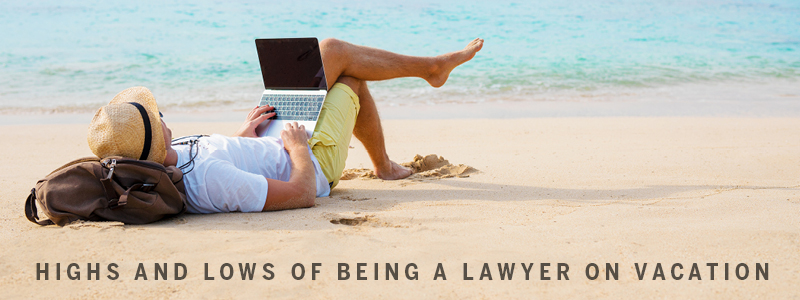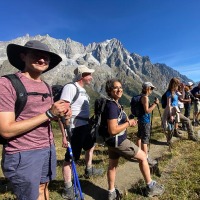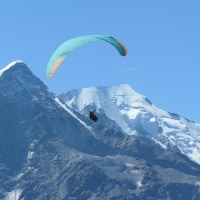
By: Kyle Kroll
When I saw the call for articles on an “interesting vacation you took this summer,” I immediately thought of my recent trip to Mont Blanc in Switzerland, France, and Italy. I enjoy sharing vacation ideas, but more than that, I considered this article an opportunity to continue the discussion about well-being in the profession and what we, as lawyers, can do to help promote not only our own well-being, but also the well-being of our peers—and civility in the process. My recent experience in Mont Blanc gave me new perspectives on this topic.
Mont Blanc Highs
In mid-August, I was fortunate to travel to Mont Blanc. If you’re not familiar, Mont Blanc.jpg?sfvrsn=4349d04f_0) (not the Matterhorn) is the tallest peak in Europe. In the shadow of this massive range lies the valley city of Chamonix, France, which hosted the first Winter Olympics in 1924. Today, the region is known for world-class skiing in the winter, and one of the best hiking trails in the world: the Tour du Mont Blanc (TMB for short). The TMB is a 100-plus-mile circuit around Mont Blanc. The path is well-marked and well-worn, with “refuges” every so many miles offering refreshments and a hostel-like place to stay for those embarking on the complete circuit. It is truly a unique combination of awe-inspiring views and hospitality found few other places around the world.
(not the Matterhorn) is the tallest peak in Europe. In the shadow of this massive range lies the valley city of Chamonix, France, which hosted the first Winter Olympics in 1924. Today, the region is known for world-class skiing in the winter, and one of the best hiking trails in the world: the Tour du Mont Blanc (TMB for short). The TMB is a 100-plus-mile circuit around Mont Blanc. The path is well-marked and well-worn, with “refuges” every so many miles offering refreshments and a hostel-like place to stay for those embarking on the complete circuit. It is truly a unique combination of awe-inspiring views and hospitality found few other places around the world.
Most lawyers I know find it hard to take a vacation for an extended period. It is hard to disconnect and get away from the hustle of private practice. Unexpected obligations arise every day, adding to the pre-existing ones, and the list gets ever longer. Add international travel on the bookends, and a trip to Europe easily extends into two weeks, which can become practically impossible. For these reasons, I knew I didn’t have the time to traverse all of TMB’s 100 magnificent miles. So I opted for a “highlights” experience, complete with lodging, meals, and a licensed guide as part of a group. The tour included six days of hiking and a free day (I paraglided for the first time).
I went to Mont Blanc because I liked what I heard about the TMB. The reports were true; I cannot recommend the experience enough. On the front end, I adjusted to the 7-hour time difference in Geneva, Switzerland—a city that has long played a prominent role in international diplomacy. The United Nations has a substantial presence at the Place of the Nations, where the former League of Nations convened. Geneva is also home to the International Committee of the Red Cross and Red Crescent. It hosts the largest cross-border collaborative science experiment on Earth: the Large Hadron Collider at CERN (take the free tour; it’s excellent). The chocolate is rich and smooth, and it is categorized by the region in which the producer milk cows grazed. Do you want a mountainous bar, or one from inland fields? My only advice is to try both—and everything in between.
When I booked the experience, I knew the hiking group would likely consist of international adventurers, but I never expected the entire group to be from England. I was quite the Minnesota “gray duck,” but they kindly welcomed me and taught me how to make a proper “cuppa” (cup of tea: English Breakfast, sugar, and a dash of milk).
of international adventurers, but I never expected the entire group to be from England. I was quite the Minnesota “gray duck,” but they kindly welcomed me and taught me how to make a proper “cuppa” (cup of tea: English Breakfast, sugar, and a dash of milk).
The (Avoidable) Lows
Taking time to “reset” is sometimes essential to mental health, especially for those in professions like ours that can be challenging on mental and emotional levels. I can honestly say the experience left me rejuvenated and filled with new energy and enthusiasm. Although vacation is not generally required by law in the United States, I was surprised to learn that the members of my British troupe have five weeks of guaranteed vacation a year (and some of my fellow hikers had eight). In my conversations with them about this, it struck me that the British have a healthier view of vacation and work-life balance than mainstream America. I recall some of them scolding me for checking emails, saying “don’t do that, you’re on holiday!” Easier said than done when new developments on cases cannot wait.
It struck me that the British have a healthier view of vacation and work-life balance than mainstream America. I recall some of them scolding me for checking emails, saying “don’t do that, you’re on holiday!” Easier said than done when new developments on cases cannot wait.
The most disappointing moment on the holiday came when opposing counsel on a case, upon learning I was on vacation, seemingly sought to take advantage of that fact for collateral purposes. Without getting into the details, opposing counsel accused me of scheduling my vacation to interfere with the schedule for motion practice. I had no such intention, and I was taken aback by the accusation. The unwarranted consternation expressed by this counsel, and their attempts to use timing to their client’s advantage, added considerable stress—the very thing that vacations are supposed to relieve! There was no need for opposing counsel to act this way.
My mentors have always told me to afford every accommodation and courtesy to opposing counsel, so long as doing so does not materially affect a client’s interests. When opposing counsel go on vacations (or holidays), I have never thought of trying to use that to my advantage. Nor do many of the attorneys I know who I’ve spoken with on this topic. But there are those among us who have the opposite inclination. They treat opposing counsel as a means to an end, and they may attempt to seize every advantage they can—such as by condemning other counsel and attempting to suggest some ulterior motive for finding a temporary retreat from legal fights.
In speaking with legal peers about my experience, I learned this kind of behavior is not as uncommon as one might think. One told me about how opposing counsel on a case involving multiple years of discovery got into the habit of sending a fresh set of discovery requests when he received an out-of-office from indicating his adversary would be unavailable for an extended period. In another example, opposing counsel on a case waited less than 24 hours to send an ex parte communication to the judge, complaining about the absent counsel in a transparent attempt to tarnish her reputation. My hope is that these kinds of mischief are atypical—but the ubiquity of “war stories” suggests otherwise. I’m a believer in zealous advocacy, but not over-zealousness.
as uncommon as one might think. One told me about how opposing counsel on a case involving multiple years of discovery got into the habit of sending a fresh set of discovery requests when he received an out-of-office from indicating his adversary would be unavailable for an extended period. In another example, opposing counsel on a case waited less than 24 hours to send an ex parte communication to the judge, complaining about the absent counsel in a transparent attempt to tarnish her reputation. My hope is that these kinds of mischief are atypical—but the ubiquity of “war stories” suggests otherwise. I’m a believer in zealous advocacy, but not over-zealousness.
Give Peers a Break
As members of the legal profession, we know the daily challenges our peers face and the toll those challenges can take. For many, vacations provide a necessary respite. I can wholeheartedly recommend hiking Mont Blanc; you will be inspired by its beauty, and the exercise also improves overall health and well-being. If opposing counsel goes on a vacation to Mont Blanc, though, I believe we owe it to that peer to refrain from attempting to use that fact at their expense. Instead, we should accommodate our peer for the betterment of the profession.
By: Kyle R. Kroll
kkroll@winthrop.com
 Kyle R. Kroll is an attorney at Winthrop & Weinstine in Minneapolis, where he practices business litigation at both the trial and appellate levels. The views expressed in this article are those of the authors alone, and not of any other person or organization.
Kyle R. Kroll is an attorney at Winthrop & Weinstine in Minneapolis, where he practices business litigation at both the trial and appellate levels. The views expressed in this article are those of the authors alone, and not of any other person or organization.